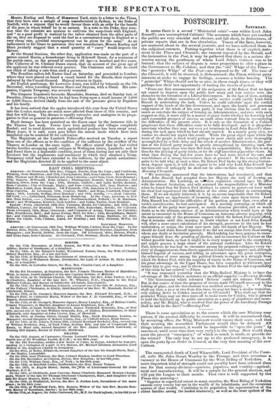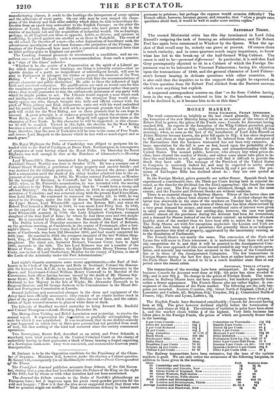The unexpected death of Lord Wharneliffe, Lord President of' the
Coun- cil, calls Mr. John Stuart Wortley to the Peerage, and thus occasions s vacancy in the House of Commons for the West Riding of Yorkshire. A. more important trial of strength could not possibly have been selected than one for that county-division-spacious, populous, and wealthy-agricul- tural and manufacturing. It will be a sample for the general election, and will put the League to their mettle. That view is well supported by the Times this morning- " Superior in superficial extent to many counties, the West Riding of Yorkshire exceeds every county but one in the wealth of its inhabitants, and the numerous sources of that smith. Combining in its population the representatives of the oldest families among the landed aristocracy, as well as the most opulent of the manufacturing classes, it sends to the hustings the interpreters of every opinion and the adherents of every party. On one side may be seen ranged the cham- pions of the Dukery and that older nobility which dates its title to hereditary dis- tinction from an epoch long antecedent to the English Peerage; on the other the denizens of Leeds, Barnsley, and Sheffield—men who have grown rich in the routine of mechanic toil and the acquisition of industrial wealth. On no hustings, perhaps, in all England can ideas so opposite, habits so diverse, and opinions so conflicting, be pitted against one another as on those in Wakefield. The creed of an old school, the theories of anew—the sober dogmatism of hereditary rank, the adventurous speculation of new-born fortune—the prejudices of the Peerage, the longings of the People—all here meet with a numerical and dynamical force that no other polling-place in England can parallel." The Leading Journal proceeds to recommend a candidate, and an ex- cellent one—Lord Morpeth: such a recommendation, from such a quarter, is a " sign of the times" indeed-
" Whether it be the genius of a Conservative or the spirit of a Liberal po- Rey which triumphs on these hustings, one thing is tolerably certain—that no ignoble drudge of a party, no insignificant or unintelligent herald, will now be sent to Parliament to interpret the wishes or protect the interests of the West Riding. * • * He [Lord Morpeth] carries with him the recommendations of private character and public distinction. He adds to these the influencb of high birth and ancestral connexion. His qualifications are such as would earn for him the unanimous approval of men who were influenced by personal rather than party views; they would guarantee to him the enthusiastic assistance of any party with which he might profess to act. The Liberals would support a man whose rank and intelligence reflected honour on their side; the strongest Tory would reluc- tantly oppose one who, though brought into daily and official contact with the pitch of Whig jobbery and Irish debasement, came out with his word undoubted and his purity unsullied. But it will not be on personal grounds that Lord Mor- peth will .trod for the West Riding, nor on these grounds that he can hope to succeed. A great principle is at stake—a principle to which the electors of the West Rid:u.; are not indifferent. Lord Morpeth will appear before them as the champion of Free Trade. In this character he will be supported; in this charac- ter he will be assailed. Viewed in this light, the election for the West Riding becomes a matter of grave import and anxious consideration. • * We hope, therefore, that the men of Yorkshire will be true to the cause of Free Trade, and restore Lord Morpeth to the honour which he lost with so much regret and so much grace."



























 Previous page
Previous page